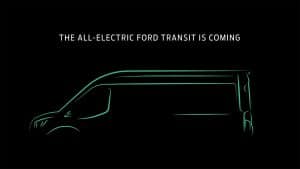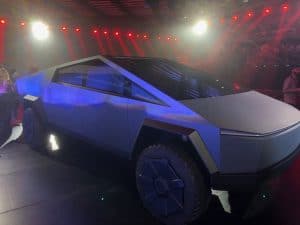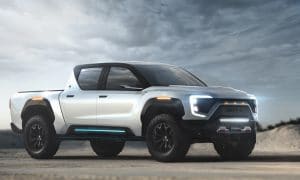
By the end of this year, Ford will launch its first long-range battery-electric vehicle, the Mustang Mach-E, but it won’t be alone for long, the automaker planning to add, among others, BEV versions of both the F-150 pickup and Transit van.
The two truck models are set to reach U.S. showrooms in mid-2022, Ford Chief Operating Officer Jim Farley revealed during an industry webinar. Both the F-150 EV and Transit EV will roll out into a market expected to see a flood of new battery vehicles, including as many as eight all-electric pickups, but Farley said he was not worried about the competition.
“With our knowledge and know-how, I like our chances against all comers as we go all-electric,” Farley said at the Deutsche Bank 2020 Global Auto Industry Conference.
(Ford electric prototype hauls 1 million pounds.)

The timetable for the F-150 EV has apparently been pushed back, according to company sources, the original plan targeting some point during the 2021 calendar year. That would have put the Ford truck in showrooms about the same time as the pickup version of the GMC Hummer – an all-electric Hummer SUV to follow. Tesla, meanwhile, has indicated it will begin selling a single-motor version of its Cybertruck late next year with more advanced, twin-motor models set for launch in 2022.
The range of new, all-electric pickups in the work has been growing, not only among conventional automakers but also new entrants such as Rivian – which has pushed back its R1T to 2021 – Bollinger, Lordstown Motors and Nikola.
The latter start-up is developing a hybrid-powered truck by the combination of a hydrogen fuel-cell and batteries. Dubbed the Badger, Nikola founder Trevor Milton told CNBC on Tuesday that it is “going after the Ford F-150 crown in the way we touch all the consumers around the world.”
Nikola plans to charge from $60,000 to $90,000 for the Badger. Ford has not yet laid out pricing plans for the F-150, though it is expected to run more than comparable versions using conventional internal combustion engines, reflecting the still-higher cost of battery technology.

Ford has teased the F-150 EV several times, one image showing an early prototype hauling a long line of rail cars carrying conventional F-150s. The all-electric model will share showroom space with a hybrid version of the pickup, but it is expected to use a completely different platform that will mount batteries and motors below its load floor. That approach not only preserves passenger and cargo space but frees up what is normally an engine compartment for a “frunk,” or front trunk.
(Click Here to watch the Ford video of the electric F-150 prototype.)
Ford has invested in Rivian but says it will not use the R1T platform for the F-150 EV. That said, insiders say the bigger automaker is picking up tips from the startup that could result in some innovative features, such as a storage pass-through similar to that on the Rivian truck.
Considering the range of body styles, powertrains and other options offered with a conventional F-150 – never mind the plans announced by rivals like Tesla with Cybertruck – Ford is expected to have multiple F-150 EV packages that could include different motor configurations and battery pack sizes that may push range up as high as 400 miles.
As for the Transit EV also scheduled to launch in 2022, it will target the U.S. market and also be offered in a variety of different configurations, the automaker revealed earlier this year. That will include cargo van, cutaway and chassis cab versions, with three roof heights and three body lengths available.

As with the F-150 EV, the Ford Transit EV is expected to face significant competition from players that include GM and Daimler.
Ford was an early pioneer in electrification with products like the Focus EV and C-Max Energi plug-in hybrid. But it has gained relatively little momentum compared to some rivals, from Toyota to Tesla. The automaker is betting $11.5 billion to push further ahead with a mix of PHEVs and long-range BEVs.
(Ford confirms plans for all-electric Transit van.)
While demand for EVs is still modest, new regulations in Europe and China should yield a big push going towards mid-decade. Meanwhile, the automaker can look to the way investors are responding to EV-focused start-ups. In recent weeks, Tesla stock has topped $1,000 and, as of Wednesday morning, shares were going for $985. Nikola, meanwhile, just went public but already has a higher market cap than Ford.







